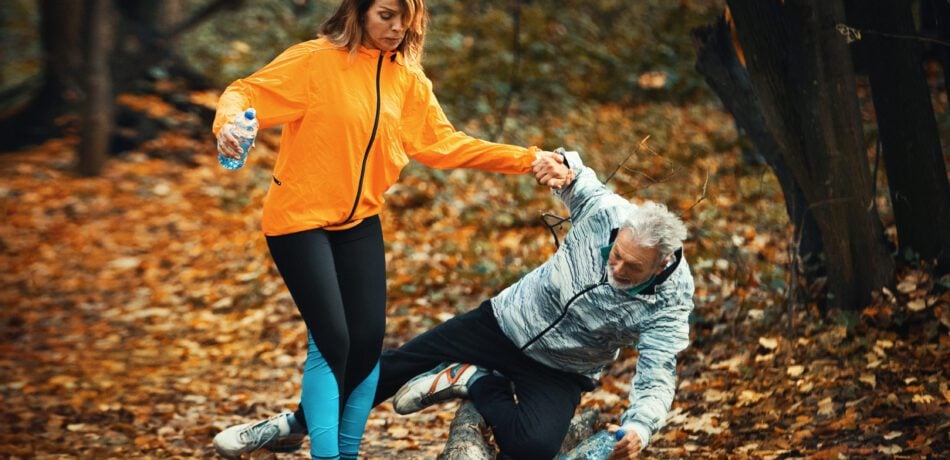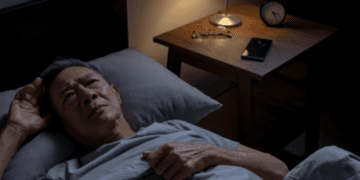January is Winter Sports Traumatic Brain Injury Awareness Month, a time to raise awareness about traumatic brain injuries (TBI) caused by extreme winter sports like snowboarding and skiing.
Now, if you don’t participate in winter sports you might be thinking you’re off the hook—but not so fast! With icy conditions increasing your risk of falls, winter creates a TBI threat for everyone—especially seniors.
That’s because studies show a high correlation between cold weather and an increase in falls among older individuals. Traumatic brain injury happens when a sudden physical impact damages the brain, and about 80% of TBI-related ER visits, hospitalizations and deaths in older adults are related to falls.
To help you avoid TBI-causing falls this winter, we’re sharing nine tips to help you stay safe at home.
1. Salt Your Sidewalks and Driveway Before Snow or Ice
If snow or ice is forecasted, apply rock salt to your sidewalks and driveway before the winter weather starts. Salt lowers the freezing temperature of water, so pre-salting melts snow and ice faster from beneath and makes removal easier.
2. Clear Your Walkways After Snow
If you’re not up for shoveling snow yourself, then ask for help or hire someone to do the job. Shoveling snow is a strenuous task and research shows many people face an increased risk of heart attack or sudden cardiac arrest after shoveling heavy snow.
3. Throw Down Kitty Litter or Sand After Clearing Snow
After your walkways are clear, you can create more traction and safer walking by putting down an abrasive material like kitty litter or sand.
4. Install Exterior Handrails
Most areas have handrail requirements for exterior stairs. For example, in some areas, if your exterior stairs have more than two steps, you need a handrail to be up to code. However, if you’re concerned about falls, consider installing a handrail for even just one step. You could also install handrails that line your sidewalks.
5. Dress for the Weather No Matter How Long You’ll Be Outside
It might be tempting to go outside and grab the mail without putting on a coat or changing out of your slippers—because it only takes a minute, right? However, what if you slip on ice and take a tumble during this quick task and end up stranded on the ground, in the cold, for a period of time without proper outerwear?
That’s why it’s important to be dressed for the weather no matter how long you’ll be outside. Wear a hat, coat, gloves and footwear with good traction even for the quickest of jaunts out into the elements. Also, be sure to always carry your cellphone or wear your medic alert device every time you step outside your home.
Guaranteed Acceptance Life Insurance
Coverage options starting at $9.95 a month!
Guaranteed acceptance life insurance without medical exams, health questions, or rate increases.
6. Slow Down and Walk With Caution
Being in a hurry and rushing inside carrying bags of groceries is asking for trouble—especially when there’s snow and ice on the ground. Focus on slowing down. What’s the rush? Be aware of your surroundings and use a slower, steady gait. The Center for Spine & Orthopedics also recommends taking shorter steps in slippery conditions.
7. Make Sure Inside Your House Is Fall Proof, Too
People often spend more time indoors during winter, so create a safer indoor environment by fall-proofing your home with these tips:
- Equip stairways with firm, secure handrails on both sides.
- Tack, repair or replace loose carpets, flooring and stair treads.
- Put nonslip treads on wooden steps.
- Avoid loose throw rugs.
- Remove all clutter from walkways.
- Remove furniture and décor from high-traffic areas.
- Store items within easy reach.
- Use nonslip bathmats.
- Consider using a bath seat and installing bathtub grab bars.
- Use toilet safety rails and a raised seat.
- Clean spilled liquids, food or grease immediately.
- Use night lights in your bedroom, bathroom and hallways.
- Place a lamp beside your bed.
- Turn on lights as you move throughout your home and ensure paths to light switches are clear.
8. Talk to Your Doctor About Your Personal Risk
Make an appointment with your doctor to assess your fall risk and discuss prevention strategies. Your doctor may want to discuss medications you’re taking, previous falls you’ve experienced and your health conditions. They may recommend exercises you can do to help improve your balance, as well as ways to protect your bone health through food sources and supplements.
Do you think a service animal could help you stay safer? Read here to see if you could qualify.
9. Try to Fall Safely
If you do feel yourself falling, there are a few things you can do to help reduce your chance of injury. The Mayo Clinic advises to not try to catch yourself with your arms; instead, try to fall on your buttock or back. After the fall, don’t spring back up. Wait for someone to come help you in case you’re injured and to avoid subsequent falls.
Life insurance is another way to manage risk against the unexpected. Get the 411 on this important product.
Colonial Penn is here for you!
Colonial Penn has specialized in making life insurance simple and accessible by offering it directly to consumers since 1957. Click here to learn more.





